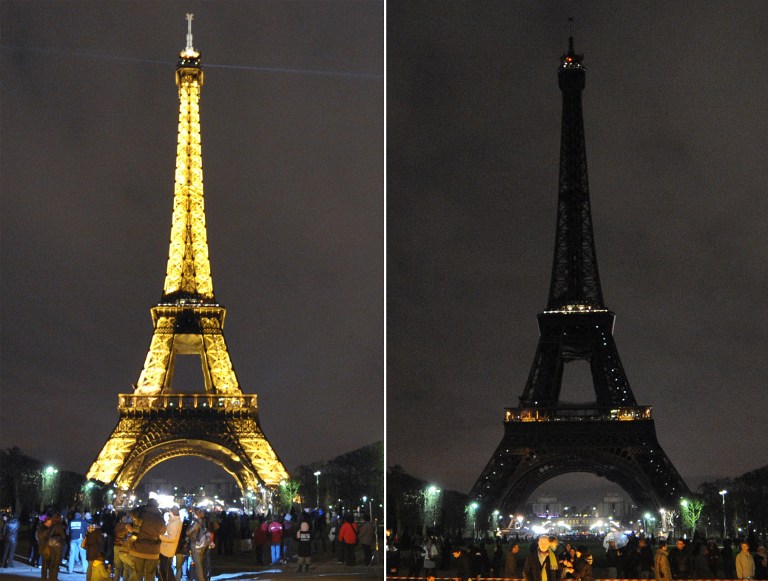SUMMARY
This is AI generated summarization, which may have errors. For context, always refer to the full article.

PARIS, France (UPDATE) – Iconic landmarks and skylines were plunged into darkness on Saturday, March 23, as the “Earth Hour” switch-off of lights around the world got under way to raise awareness of climate change.
Organizers expect hundreds of millions of people across more than 150 countries to turn off their lights for 60 minutes on Saturday night — at 8:30 pm local time — in a symbolic show of support for the planet.
In Paris, the city of light, the iconic Eiffel Tower turned off its illumination — but for security reasons only for five minutes.
Moscow’s Kremlin went dark for a full hour for the first time, following a decision by President Vladimir Putin, which also included some 90 monuments around the Russian capital.
Saint Mark’s Square in the heart of Venice switched off its illumination, using only candles to light the area including tables at local restaurants.
In Serbia, 58 towns across the country took part in the event. In the capital, among the public buildings plunged into darkness were the national parliament, the national museum and all five Belgrade bridges.
A group of volunteers lit candles in a central park making sign 60+ to mark the event.
In neighboring Bosnia the lights were turned off at Sarajevo cathedral and at the Old Bridge in the southwestern town of Mostar, which dates back to the Ottoman empire.
Earlier, Sydney had kicked off the event at 8:30 pm (0930 GMT), cutting lights to cheers and applause from a small crowd who had gathered to see the skyline dim and Sydney Opera House turn a deep green to symbolize renewable energy.
“It’s been a very inspiring night because it’s all about hope and change,”said Jessica Bellamy, watching the event in Sydney.
Japan switched off soon after Australia, with the illumination on the landmark Tokyo Tower dimming down as visitors were given the chance to pedal bicycles to generate power to illuminate an egg-shaped artwork.
The Hiroshima Peace Memorial, a designated UNESCO World Heritage Site in the country’s west, also sat in darkness.
In the Chinese capital Beijing, lights were shut off at the former Olympic stadium, the “Bird’s Nest”, while in the commercial hub of Shanghai buildings along the famed riverfront Bund also took part.
Some hotel guests in the city’s financial district were asked to respect the event and turn off lights in their rooms for an hour.
Hong Kong’s iconic skyline appeared to vanish into the night as the neon lights and advertising hoardings that usually brighten the sky were turned off, leaving the harbor in darkness.
In Singapore a crowd of almost 1,000 people watched from a floating platform as landmarks on the skyline dimmed, before a pulsating musical performance had people dancing in the dark ahead of a film screening.
India’s capital New Delhi switched off floodlights at some of its iconic monuments including Qutab Minar, Humayun’s Tomb and the sprawling Red Fort.
While more than 150 countries joined in last year’s event, the movement has spread even further this year: the Palestinian territories, Tunisia, Suriname and Rwanda are among a host of countries pledging to take part for the first time.
Earth Hour originated in Sydney with a simple appeal to people and businesses to turn off their lights for an hour to raise awareness of carbon pollution.
“What started as an event in Sydney in 2007 with two million people has now become a tradition across the country and across the world,” said Dermot O’Gorman, head of WWF-Australia.
“I think the power of Earth Hour is in its ability to connect people and connect them on an issue that they really care about which is the environment,” said O’Gorman as the city stood in darkness.
“Earth Hour shows that there are millions of people around the world who also want to do something.”
O’Gorman believes Earth Hour has played a part in drawing attention to energy use.
“Earth Hour has always been about empowering people to realize that everybody has the power to change the world in which they live, and thousands of people switching to renewable energy is a perfect example,” he said. – Rappler.com
Add a comment
How does this make you feel?
There are no comments yet. Add your comment to start the conversation.